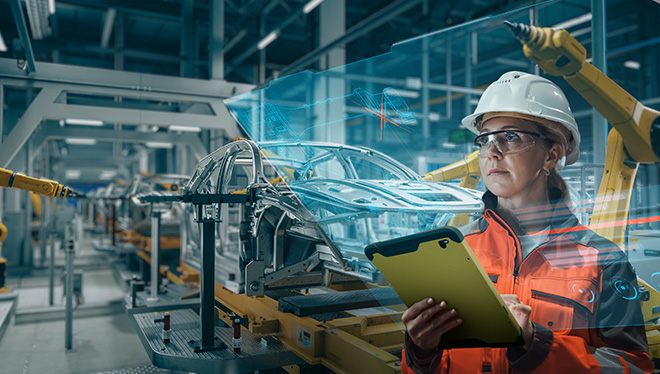Subscribe to ADI and Receive the Signals+ Newsletter
Stay updated on Analog Devices and industry news and events and receive Signals+ with the latest insights, information and ideas on Connectivity, Digital Health, Electrification, and Smart Industry.
Thank you for subscribing to ADI Signals+. A confirmation email has been sent to your inbox.
You'll soon receive timely updates on all the breakthrough technologies impacting human lives across the globe. Enjoy!
CloseREUTERS: EXPANDING POSSIBILITIES THROUGH ADVANCED AUTOMATION
Advancements in connectivity, automation, sensing, and decision-making at the Intelligent Edge are driving digitalization and ever-smarter manufacturing. To fully leverage these capabilities, however, requires interoperability, agility, and collaboration. Manufacturers who embrace these innovations and new, more holistic industry views will have an edge in responding to market demand for customer-specific, time-sensitive offerings and new avenues to growth.
Watch highlights of this panel discussion, held in partnership with Reuters, featuring leaders from the industrial manufacturing ecosystem as they discuss how personalized manufacturing allows flexible operations and growth.
Featured Participants:
- Fiona Treacy, Senior Director, Industrial Automation Business Unit, Analog Devices
- Ken Creasy, Former Senior Director of Manufacturing Technology and Innovation and Advanced Engineering, Johnson & Johnson
- Adam O’ Toole, Director Enterprise Architecture, Manufacturing and Engineering, Novartis
- Erika Musso, Senior Project Director, Supply Chain and Manufacturing, Reuters Events (Moderator)
Featured Video Segments:
- Key Trends in the Manufacturing Industry
- Flexibility in the Manufacturing Industry
- Supplier Relationships and the Importance of Collaboration
Key Trends in the Manufacturing Industry
Connected factories and integrated supply chains are still discovering the full potential of data, analytics, and insights to unlock hidden capacity in manufacturing. Yet even as the industry explores this trend, a new one is emerging, and that is the trend away from mass production and toward mass customization. Higher bandwidth networks, low latency, and interoperability will enable this advanced automation and customization.
Flexibility in the Manufacturing Industry
Early automation was useful only for making a single product. Today, with the agility of smart manufacturing, interoperability, and modular factory design, automation can be leveraged to switch production and make what is needed when it is needed, improving accessibility and reducing waste for a greener and more equitable future.
Supplier Relationships and the Importance of Collaboration
Automation and energy efficiency can dramatically improve productivity and profitability on the factory floor. Collaboration is the key to new efficiencies and environmental benefits, which add value for stakeholders while also making flexible factories more customer-centric and competitive. Vendors who take a holistic view of interplay and scalability will have the advantage in this transition.




